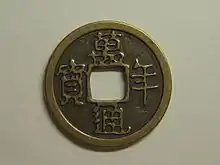Tenpyō-hōji
Tenpyō-hōji (天平宝字) was a Japanese era name (年号,, nengō,, lit. "year name") after Tenpyō-shōhō and before Tenpyō-jingo. This period spanned the years from August 757 through January 765.[1] The reigning monarchs were Junnin-tennō (淳仁天皇).[2] and Shōtoku-tennō (称徳天皇).[3]
Events of the Tenpyō-hōji era

Copper coin used in the Tenpyō-hōji era
- 757 (Tenpyō-hōji 1'): The new era began in the 8th month of Tenpyō-shōhō 9.[4]
- 760 (Tenpyō-hōji 4): Newly minted coins were put into circulation – each copper coin bearing the words Mannen Ten-hō, each silver coin bearing the words Teihei Genhō, and each gold coin bearing the words Kaiki Shōhō.[5]
- 26 January 765 (Tenpyō-hōji 9, 1st day of the 1st month): In the 6th year of Junnin's reign, the emperor was removed from his role as monarch; and the succession (senso) was received by former-Empress Kōken. Soon after, Empress Shōtoku's reign was confirmed by ceremonies (sokui).[6]
Related pages
References
- Nussbaum, Louis-Frédéric. (2005). "Tenpyō-hōji" in Japan Encyclopedia, p. 957.
- Nussbaum, "Junnin Tennō," p. 437; Titsingh, Isaac. (1834). Annales des empereurs du Japon, pp. 75-78; Brown, Delmer et al. (1979). Gukanshō, p. 275.
- Nussbaum, "Shōtoku Tennō," p. 888; Titsingh, Annales des empereurs du Japon, pp. 78-81; Brown, p. 276; Varley, H. Paul. (1980). Jinnō Shōtōki. p. 145.
- Brown, p. 274.
- Appert, Georges. (1888). Ancien japon, pp. 29-30.
- Brown, p. 276; Varley, p. 44; a distinct act of senso is unrecognized prior to Emperor Tenji; and all sovereigns except Jitō, Yōzei, Go-Toba, and Fushimi have senso and sokui in the same year until the reign of Emperor Go-Murakami. Compare Imperial Household Agency (Kunaichō), Ceremony of Accession (Sokui-no-Rei); retrieved 2012-5-22.
Other websites
- National Diet Library, "The Japanese Calendar" -- historical overview plus illustrative images from library's collection
| Tenpyō-hōji | 1st | 2nd | 3rd | 4th | 5th | 6th | 7th | 8th | 9th |
|---|---|---|---|---|---|---|---|---|---|
| 757 | 758 | 759 | 760 | 761 | 762 | 763 | 764 | 765 |
| Preceded by: Tenpyō-shōhō |
Era or nengō: Tenpyō-hōji |
Succeeded by: Tenpyō-jingo |
This article is issued from Wikipedia. The text is licensed under Creative Commons - Attribution - Sharealike. Additional terms may apply for the media files.